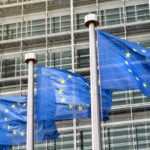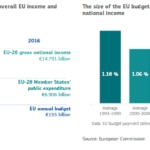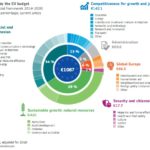How will the EU spend its budget?
For every 100 euros European citizens earn, they pay an average of 50 euros in taxes and contributions. Of the amount they pay in taxes, only 1 euro is devoted to financing the budget of the European Union. Thus, in total, Europe manages a budget equivalent to 1% of the gross national income of its Member States. However, the way this money is invested has a direct impact on the lives of Europeans.
The current climate of change inside and outside Europe has led the European Commission to reflect on the future of its public accounts. In the document entitled 'The Future of EU finances', the Commission analyzes the current configuration of the budget and its future options. This document is part of a series of reflections brought about by the White Paper on the future of Europe, which set forth the different challenges and scenarios the EU will be facing through 2025.

The EU’s annual budget currently stands at €155 billion. Today, the EC acknowledges that ‘brexit’ entails the loss of a contributor (the United Kingdom) to the funding of EU policies and programs. But it is also an opportunity to modernize them.
What should the EU budget help achieve?
The Commission has a clear idea about the basic lines on which European taxpayer money should be spent. In first place, to increase security and protection for EU citizens. In the second place, to bolster the economic strength, sustainability and solidarity of European finance by investing in public goods such as the European Fund for Strategic Investments, the 'Juncker Plan', or projects such as the Galileo satellite network. The EU also includes in this chapter the funds to boost cohesion and sustainable agriculture. The third priority is migration.

What are the future options of European finances?
For the Commission, it is essential that the Community budget respond to current trends and new challenges, such as migration and refugees, border control, cybersecurity, the fight against terrorism and common defense. It also believes that it is necessary to reduce economic divergences between countries and to advance in research and development. Other concerns include the environment, foreign policy, and reform of the common agricultural policy and cohesion policy.
In short, it seeks to increase efficiency, simplify and modernize European accounts. To this end, it sets forth five possible scenarios for the future of its finances:
1. Carrying on: The EU-27 continues meeting its current positive reform agenda. The percentage devoted to cohesion and agriculture - which now accounts for 70% of budgetary expenditure - would drop. New priorities such as security, migration and defense would be added. The revenue system would hardly change, but other sources of revenues or fees would be implemented on top of the current ones .
2. Doing less together in all fields, with a significant budgetary reduction, especially in the funds devoted to agriculture and cohesion and a greater use of financial instruments and guarantees. The single market program would be maintained while others, such as Erasmus and other health, culture or research and innovation initiatives, would be discontinued. Current sources of income would be maintained.
3. Some countries do more, in certain areas. The budget would be substantially increased to cover new areas of joint action. Enhanced cooperation in spending and funding beyond the EU budget would be included. In terms of income, the new policies would be funded only by the participating countries.
4. A radical redesign, with EU 27 doubling efforts in some areas, but doing less in others. It includes a reduction of spending on common agricultural policy and cohesion, as well as the reinforcement of new priorities such as security and defense, and other existing ones such as transport, energy, research and development. The revenue system would be simplified and part of the funding would come from own resources, with a contribution linked to the attainment of political objectives.
5. Doing much more together in all sides of the political spectrum, with a significant increase in budget and additional funding of new priorities and external action. Spending on agricultural policy would increase. A venture capital fund would be created. Revenue reform goes beyond the proposal in the previous scenario, with new own resources to finance a large percentage of the EU budget and other sources of income.
